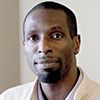Michael B. Maine nearly circulated an APB for signs of “blackness” in Seattle. Newly settled, the Dallas transplant craved the connection and belonging his former black community bathed him in.
With an African American population a sixth of his hometown, and seemingly cloaked in invisibility, the freelance photographer and visual artist says he struggled mightily to find black friends, and businesses, in his new home.
Instead, he experienced shreds of a demographic that rarely overlapped, partitioned out based on profession, neighborhood and generation.
“It took me a few years to learn where black people congregate and recreate,” he said.
His own boss, Maine, 34, offers photography, videography and audio production to individuals and businesses looking for help with marketing and storytelling campaigns.
Too often, he said, his clients ask, “where can I find black folks in Seattle to hire?”
Seven years of attachment to local black cultural organizations like art space CD Forum and the Northwest African American Museum gradually led to more integration with the community here.
It also spurred him to create his “Blacks Making History” photography project. Unsatisfied with the contributions of African Americans mainly being commemorated during the shortest month of the year, Maine photographed 50 black people recognized as making positive impacts in the community.
Fascinated by their life stories, he quickly reconsidered the scale of the project.
“I wanted the focus to be not on the pictures but on the people in them who were doing the work,” he said.
One of those people happened to be Tim Lennon, executive director of the Langston Hughes Performing Arts Institute. The two friends discussed exhibiting the project at the historic Central District cultural hub named for the revered Harlem Renaissance era writer.
Exhausted with the narrative of Seattle’s disappearing black population, punctuated by a 50% plummet in the number of black residents living in the historically black CD, between 1970 and 2014, the conversation swiftly turned to the need for celebrating and convening black people during a precarious period when many struggle to maintain their residency.
“We Out Here” was soon born. The festival that began Friday and continues through Wednesday honors black civic, artistic and literary excellence, while providing networking opportunities for professionals, artists and activists.
It also aims to alleviate a sense of isolation felt by newcomers, and black community members who have packed up for cheaper parts of King County to afford housing.
“This is all about the relationships we still have with one another. We’re focusing not so much on what we’ve lost but what we’re doing to remain, and assert our presence in the region,” said Lennon.
Much of that focus will lock on the integral part black people play in the everyday functioning of the city, from doctors to coders to engineers. Maine wanted to showcase the spectrum of black culture in the city as a normal fixture of life.
“Black excellence is everywhere in the city,” he said, “from someone [who makes] sure another person is fed today, has clothes, or made it to school safely.”
Part of that presentation includes dance performances, and workshops geared toward creating generational wealth, careers in engineering, saluting black trans women and health consciousness.
Maine leaned on suggestions and relationships with the city’s larger black community to sign up more than 25 presenters for the free festival, including Nichelle Alderson, who will be participating in a workshop on wellness in the black community.
“We need to address toxic habits, toxic behaviors and addictions. Otherwise, our genius is lost because we’re eating crap off the shelf,” said Alderson, a nutrition counselor who has lived in Seattle most of her life.
With the city’s changing racial composition, black people currently make up a little over 7%, a figure in steady decline since 2000. As a result, Alderson joins many in the black community who have intentionally had to make their hometown feel like one.
“I was walking and a white lady recently welcomed me to the neighborhood that I grew up a block away from, like I didn’t belong,” she said.
Alderson shares that such experiences make “We Out Here” essential for black people who find themselves in situations similar to Maine’s when he arrived in Seattle.
“I feel sad for people who feel there is no community out here for them,” she said. “But we need to stop saying there’s nothing going on out here. We have a beautiful city of us.”
As much as he created “We Out Here” to fill a need, Maine emphasizes that other organizations, such as black co-working collective Here Seattle, serve the same goals, and he would love to collaborate with such organizations for future festivals.
There’s at least one collaboration happening at the inaugural festival dear to Maine’s heart. A conversation between young people and elders will be featured Tuesday night.
Georgia McDade, the first African American woman awarded a Ph.D. in English by the University of Washington — a 52-year Seattle resident — will be participating and has already cued up her message for those fretting over the prospects of the city’s shrinking community.
“We’ll always survive in Seattle because there’s enough of us to make sure we do,” she said.
Black people are out here.

The opinions expressed in reader comments are those of the author only and do not reflect the opinions of The Seattle Times.